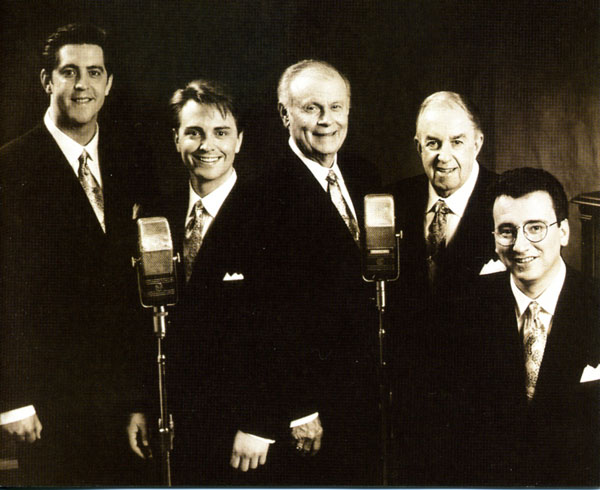In Celebration of the Human Voice - The Essential Musical Instrument
Home | Doo Wop | Barbershop | World | Contemporary | Christian | Vocal Jazz | Choral | Christmas | Instructional | Arrangements
Classical | Opera | Musicals | Personality | Young Singers | Disney | Videos | Songs | The Artists

Cathedrals

Group.
From 1964 through 1999, a group many cite as the finest example of Southern Gospel quartet singing ever toured the nation and the world. This section of SouthernGospelBlog.com's Reference section preserves the history of the Cathedral Quartet. Learn more about their members over the years, or about the groups they sang in before and after their Cathedral tenure. View a comprehensive discography, a list of the awards the group received, or group pictures. Or, find the lyrics to about 150 songs the Cathedrals recorded.
The Cathedral Trio-Bobby Clark, Glen Payne, and Danny Koker-was formed at the Cathedral for Tomorrow in Akron, Ohio in 1963. It started as an outgrowth of Earl and Lily Weatherford's ministry at Rex Humbard's Cathedral of Tomorrow. All of the original Cathedral members sang with the group at one point or another. George Younce sang with the Weatherfords in the 1950s; when he left the group along with several other other members, Earl Weatherford hired Armond Morales to replace him. Glen Payne joined the group at the same time.
By 1963, Glen Payne, Bobby Clark, and Danny Koker were all part of the group. When Earl and Lily Weatherford decided to move to California that year, Payne, Clark, and Koker decided to stay with the Cathedral of Tomorrow, and the Cathedral Trio was born.
In 1964, they added bass George Younce and became a quartet. For the first several years of their existence, they performed and travelled with evangelist Rex Humbard, the pastor of the Cathedral for Tomorrow.
In 1968, tenor Bobby Clark left; he was replaced by Mack Taunton. Baritone and pianist Danny Koker left in 1969; he was replaced by baritone/pianist George Amon Webster. Also in 1969, Glen Payne and George Younce made the Cathedrals a separate business entity. Though they were no longer a part of the Cathedral of Tomorrow in Akron, they kept their home base in Stow, Ohio.
Over the next few years, the quartet struggled to survive. During this time, several tenors, baritones, and pianists stayed with the group for brief stints. Roger Horne replaced Mack Taunton at tenor; Bobby Clark returned briefly after Horne left. Roger Horne, Roy Tremble, and Bill Dykes all served short stints at the baritone position. Lorne Matthews, Jim Garstang, and George Amon Webster all played piano during this time.
In the years 1972-74, the Cathedrals established a stable lineup that would last for several years; Roy Tremble moved to the tenor position, George Amon Webster returned to the baritone position, and Haskell Cooley joined as pianist. They moved into the second tier of Southern Gospel groups with their 1974 single "The Last Sunday." They finally started getting airplay on radio stations and winning awards.
During the late 1970s, Bill Gaither started introducing the Cathedrals to a contemporary audience through his PraiseGathering events. Though their popularity started expanding, the group took a severe hit in 1979 when three group members (Tremble, Webster, and newly arrived pianist Lorne Matthews) left to form their own trio, the Brothers.
However, Younce and Payne hired Kirk Talley to sing tenor and Steve Lee to sing baritone and play piano, and began to regroup. After a year on the road, Lee decided that he did not want to perform with a full-time quartet, and was replaced by Kingsmen bass guitarist and vocalist Mark Trammell. Roger Bennett was hired to play piano, and one of the most popular Cathedrals lineups had formed.
This lineup lasted until 1983, when Kirk Talley left to form the Talleys. He was replaced by Singing Americans tenor Danny Funderburk. From 1986-88, when Roger Bennett left the Cathedrals for about two years, Gerald Wolfe played the piano. He also sang vocals, most notably on the Cathedrals hit song "Champion of Love" from their "Symphony of Praise" project. After Gerald Wolfe left the Cathedrals to pursue a solo career, Roger Bennett returned and stayed with the Cathedrals until the group retired.
In 1987, George Younce had a heart attack. After a slow and difficult recovery, he was eventually able to return to the road.
In 1990, Danny Funderburk left the Cathedrals. After Kurt Young sang with the group for several months, Ernie Haase joined the group. Shortly thereafter, Mark Trammell left the group, to become one of the founding members of Greater Vision (along with former Cathedrals pianist Gerald Wolfe, who sings lead in the trio). Trammell was replaced by Scott Fowler.
This lineup of the Cathedral Quartet-with Ernie Haase singing tenor, Glen Payne singing lead, Scott Fowler singing baritone, George Younce singing bass, and Roger Bennett playing piano-lasted through the Cathedrals' 1999 retirement. The Cathedrals had announced their retirement due to George Younce's declining health; however, Glen Payne came down with and died of cancer during the Cathedrals' farewell tour. Roger Bennett filled in at the lead position for their final farewell concerts.
Gospel Groups | Gospel CDs | Christian Groups | Contemporay Christian CDs
Spirituals CDs | Sacred Harp | Gospel DVDs | Contemporay Christian Christmas
Spirituals Arrangements | Spiritual Solo Songbooks | Gospel Arrangements | Christian Solo Songbooks | Christian Arrangements
Select a Category |
Want to Sing? - Find a Chorus Near You
List of Choruses by State | List of Choruses by City
